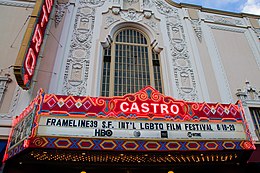Frameline Film Festival
 Castro theatre during Frameline39 in June 2015 | |
| Location | San Francisco Bay Area |
|---|---|
| Founded | 1977 |
| Awards | Frameline Award |
| Website | frameline |
The Frameline Film Festival (also known as San Francisco International LGBTQ+ Film Festival and formerly known as San Francisco International LGBT Film Festival; San Francisco International Lesbian and Gay Film Festival) began as a storefront event in 1976.[1] The first film festival, named the Gay Film Festival of Super-8 Films, was held in 1977.[2] The festival is organized by Frameline, a nonprofit media arts organization whose mission statement is "to change the world through the power of queer cinema". It is the oldest LGBTQ+ film festival in the world.[a]
With annual attendance ranging from 60,000 to 80,000, it is the largest LGBTQ+ film exhibition event.[citation needed] It is also the most well-attended LGBTQ+ arts event in the San Francisco Bay Area.[citation needed] The festival is held every year in late June according to a schedule that allows the eleven-day event's closing night to coincide with the City's annual Gay Pride Day, which takes place on the last Sunday of the month.
Films screened at the Frameline Film Festival have been donated to the Hormel Center at the San Francisco Public Library.[5] An initial donation was made in 2005, and the library partnered with the Bay Area Video Coalition (BAVC) for conservation of video recordings.[6]
In 2020 the festival was one of the key partners, alongside Outfest Los Angeles, the New York Lesbian, Gay, Bisexual, & Transgender Film Festival and the Inside Out Film and Video Festival, in launching the North American Queer Festival Alliance, an initiative to further publicize and promote LGBT film.[7]
Awards
[edit]The festival's annual awards include The Frameline Award given to an individual who has played a key role in the history of LGBTQ+ cinema, Audience Awards for Best Feature, Best Documentary, Best Episodic, Best Short, and Juried Awards for First Feature, and Outstanding Documentary.[8]
See also
[edit]Notes
[edit]- ^ Contrary to local legend the 1977 event in San Francisco was not the world's first gay film festival. That title goes to a "Festival of Gay Films" staged in Australia by the Sydney Filmmaker's Co-op in June 1976.[3] However, that was a one-time event. The Australian Film Institute founded The “Gay and Lesbian Film Festival” that became the direct precursor to today’s Mardi Gras Sydney Gay Film Festival two years later, in 1978.[4] Which leaves the San Francisco event, with its 1977 debut, as first in the US, and the oldest continuous annual Gay Film Festival in the world.
References
[edit]- ^ Stack, Peter (January 20, 1995). "Gay Film Festival to Go On Despite Director's Vanishing". San Francisco Chronicle. p. D1.
- ^ "Gay Film Festival of Super-8 Films Program Guide (Frameline 1977)". issuu. Frameline. February 2, 1977.
- ^ Queer cinema as a fifth cinema in South Africa and Australia, by Ricardo Peach, PhD Thesis https://search.lib.uts.edu.au/discovery/fulldisplay?docid=cdi_proquest_journals_3039733120&context=PC&vid=61UTS_INST:61UTS&lang=en&search_scope=MyInst_and_CI&adaptor=Primo%20Central&tab=Everything&query=any,contains,Queer%20cinema%20as%20a%20fifth%20cinema%20in%20South%20Africa%20and%20Australia&offset=0
- ^ "Queer Screen | History".
- ^ Majko, Matthew (October 1, 2015). "Frameline film trove finds home at Hormel center". Bay Area Reporter. Retrieved October 13, 2015.
- ^ Cump, Sarolta Jane (October 6, 2011). "It just gets better all the time: Preserving the Hormel Center's Frameline Movie Archive Project". Day of Digital Archives. Retrieved October 13, 2015.
- ^ Jeff Ewing, "Major LGBTQ Film Festivals Partner To Create The ‘North American Queer Festival Alliance’ (NAQFA)". Forbes, June 17, 2020.
- ^ "Festival Awards". www.frameline.org. Archived from the original on September 18, 2021. Retrieved August 31, 2020.
Further reading
[edit]- Lofton, Charles (Fall 1996). "Festival Roundup: San Francisco International Lesbian and Gay Film Festival". Filmmaker.
- Morris, Gary (August 1, 1999). "Empty Closets: The 1999 San Francisco International Lesbian and Gay Film Festival". Bright Lights Film Journal.
- Parachini, Allan (October 17, 1990). "NEA Investigation Exonerates S.F. Gay Film Festival : Endowment: The previously undisclosed inquiry is the first under the agency's controversial 1990 anti-obscenity controls". Los Angeles Times.
- Wall, Alix (June 20, 2003). "Anti-Israel protest at film fest irks local gay Jews, consulate". Jewish News of Northern California.
External links
[edit]- Official website
- Frameline Program Guides Archived September 18, 2021, at the Wayback Machine
- Frameline Film Festival Collection at Online Archive of California
- San Francisco International Lesbian and Gay Film Festival at WorldCat
- Frameline Film Festival Trailers YouTube Playlist
